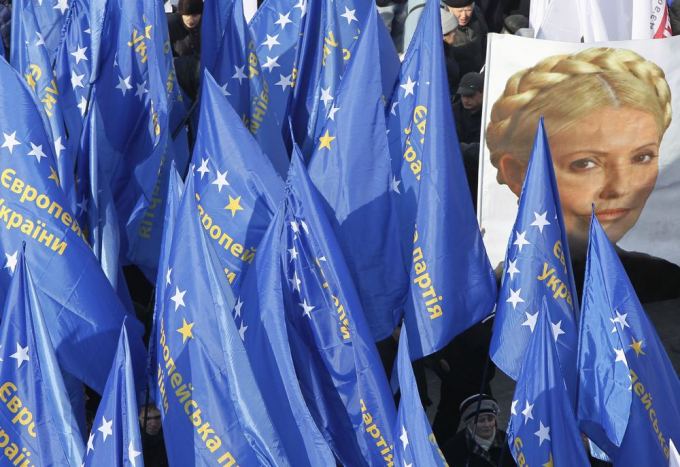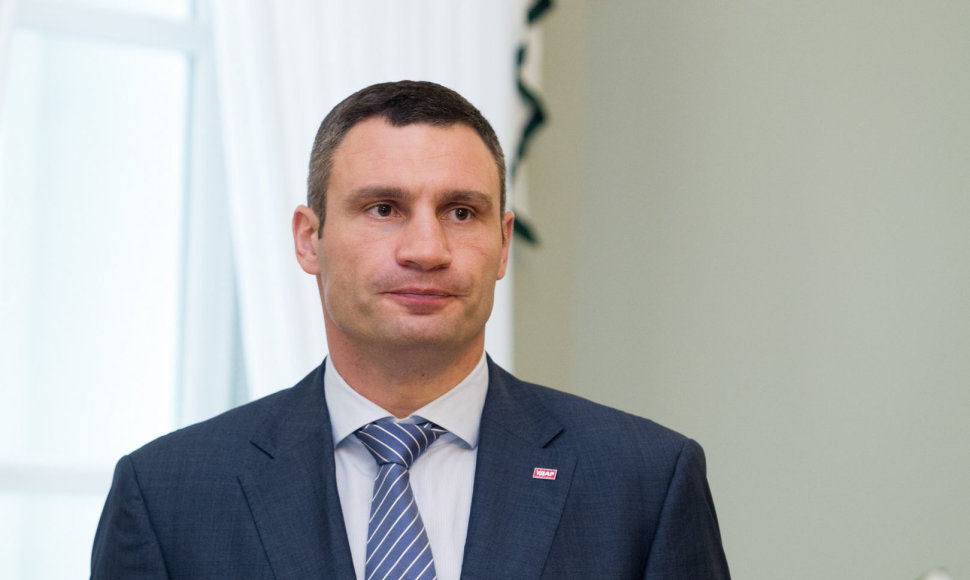In an exclusive interview to BNS, Klitschko says that he will decide on joining the presidential race after looking into public opinion.
Klitschko, 42-year-old world champion by the WBC version, says he will reveal his career plans after Saturday's boxing fight between his brother Wladimir Klitschko, also a world champion, and a Russian boxer.
- Many analysts and politicians say 2013 is a decisive year for Ukraine after many years of balancing between the EU and Russia. Do you think that Ukraine is making a historic choice this year, or even these months?
- The direction which we develop in the next years will depend on these months. It is a historical decision, and I am sure we have taken the right decision (European direction). A lot depends on our friends, on the EU, but much more depends on us, the Ukrainians. We have to do all the homework, to adopt European laws and ensure human rights - and I talk here about political prisoners and Yulia Tymoshenko.
- After meeting you and other oppositions leaders in Vilnius, Lithuanian President Dalia Grybauskaitė said that "common efforts of Ukraine's position and opposition is a must for signing association agreement in Vilnius summit in November. Is Ukrainian political elite - both from position and opposition - united in this goal?
- We have a political fight with each other and we have a different ideology than party in power. But we all have one country. We have been fighting for the European integration for a long time, and now we are happy that majority in the parliament have the same idea and we fight for European integration together.
We wish for changes in our country because we cannot live in the same conditions as before. Our decision is European family and we want to be part of it. Geographically, historically, mentally we are European but we have to change the life standards.
- Do feel pressure from Moscow? Is Russia capable of derailing the association and free trade deal?
- Of course, Russia is not happy with that. These are political questions because Russians themselves enjoy European standards of life: they like European cars, if they have a chance, they spend vacation in Europe and send children to get European education or get medical treatment in Europe.
It's our decision about our future and the direction which we develop, and it has nothing against Russia. We want to have a modern democratic system in Ukraine, a European system.
Russians try to suggest an idea: "You are with us or against us". We are for Ukraine! We are just for new level of values where human rights are in the top.
- The Kremlin aide Glazyev warned of “social unrest” in Ukraine if it signs EU deal. You said that a majority in parliament supports the signing of the agreement. But is there a split within the society?
- Every citizen in Ukraine wants to be sure about the future, about his children's future, about jobs. Businesspeople want to be sure about their investments. Every worker wants to be sure about life standards of his family. Every farmer who works in agriculture looks to making money, but despite having the best soil in the world, the stand of our agriculture is horrible. Every youth is looking for guarantee for good education, and a job after that. It means European standards of life all together. It's our task to do that, and it's our chance.
We need help, we need rules, friends of Ukraine can support us. That's why it is very important to sign an association agreement in Vilnius. It's a strategic decision for the future of our country.
 |
| Julijos Tymošenko portretas |
- You already mentioned the case of Yulia Tymoshenko. Both opposition and Western governments demand that she is released, at least for medical treatment, before signing the EU deal. Is there a plan B if President Yanukovych, Ukrainian authorities keep her in jail?
- If President Yanukovych really wants to provide European integration for Ukraine he will release Yulia Tymoshenko. I don't want to talk about the worst case scenario for Ukraine. I am an optimist. The Ukrainian government and personally Viktor Yanukovych, who has absolute power in Ukraine, and fully responsible for that.
If the association agreement will not be signed, it means the fall of government and President Yanukovych. After such a disaster there would be only way for President Yanukovych - to resign.
But we have time to adopt European laws in the parliament. Other conditions have to be fulfilled by Yanukovych and his government.
- To be clear on that - if the deal is not signed, which is still possible, would you demand his resignation, would you appeal to your people to go to streets?
- If we lose the chance and go to the streets, how can we help to return our chance back? There is just one way - to change power in Ukraine.
- Many say everything will depend on whether President Yanukovych overcomes his fears. And probably he could be afraid that if he loses power, he may be sent to jail himself by the new government. Do you think there is a reason for Yanukovych to be afraid of that?
- Some people talk about that because Viktor Yanukovych opened a pandora box. And we, new politicians, have to close this box. Every politician has to take political responsibility for his political decisions, not the criminal responsibility.
Then we cannot build modern country with this kind of political culture.
- If the deal is signed, it will still need ratification in Ukraine. Some are concerned that Ukraine still can decide to hold a referendum on whether to choose EU association agreement or Customs Union. Is a referendum possible?
- We have polls, which show that more than 50 percent of Ukrainians like European standards of life and see our future in the European family. The law concerning the European direction for our country has already adopted, so there is no need in referendum.
- When do you believe Ukraine could become a full member of the European Union?
- It depends on us, on Ukraine. We have to see how fast we can take the steps. We have good examples how Poland, Slovakia, Hungary, Lithuania did it. It is a process and we need a couple of years. It is not just to sign, it is to be a member of the EU. We have to build Europe inside Ukraine - European rules and standards in economy, in politics, and European standards of life. We, Ukrainians, have to understand that we must take responsibility for that, not somebody else.
- What is your opinion about possible NATO membership. Is that off agenda now?
- I don't want to put all questions in one box. The first thing is the association agreement. We have huge influence of Russian media in Ukraine, and we have to build public opinion about our military strategy.
Now we cooperate with NATO a lot in anti-terrorism programs and in emergency situations. It is a step-by-step approach.
- Will you run in the presidential elections in 2015, if you get support from other opposition parties - Yulia Tymoshenko's party and Swoboda party?
- It will depend not on parties but on the people in Ukraine. Ukrainian citizens, not the party leaders will decide. We present our program in the regions of Ukraine. If our program receives support of people, just after that we can decide. The candidate has to be who has the biggest support by the people. So, the one with the biggest chances to win against Yanukovych.
- In one interview you have said the main difference in boxing and politics is that you have clear rules in boxing but Ukrainian politics sometimes is fight without rules. Do you expect rules to be in place for 2015 elections?
- If we sign the association agreement, I am more than sure it will have more European standards and we will have a control of the EU. Without signing of the association agreement, it will be much more complicated.
- My last question: is your boxing career over or you still have one farewell fight on your agenda?
- Next Klitschko activity in boxing will be in five days. My brother will be defending his title and fight in Moscow against Russian champion Alexander Povetkin. It is a very important fight for Wladimir, it's a very important fight for sport. And I hope it will be very important fight for our country. Hundreds of millions fans in more than 150 countries will be watching the fight.
If I go in the street, many people keep asking me: are you the older or a younger brother, are you Wladimir or Vitali? Fifty percent of people don't understand who will be fighting because we have same parents and look so similar, and we both are so successful in sport.
Regarding my career, I will make the decision very soon what will be the next activities. We are now looking forward to Wladimir Klitschko's fight and after that we can say a little bit more about my career.












